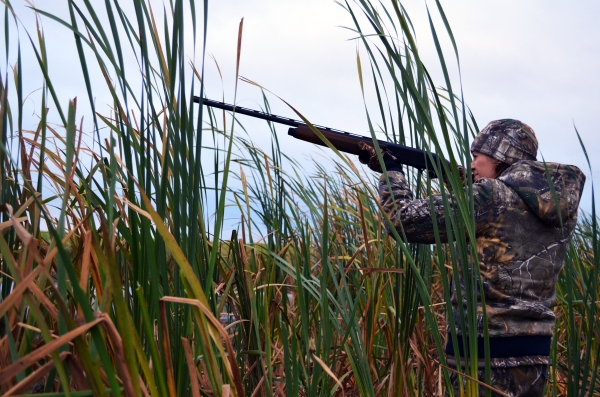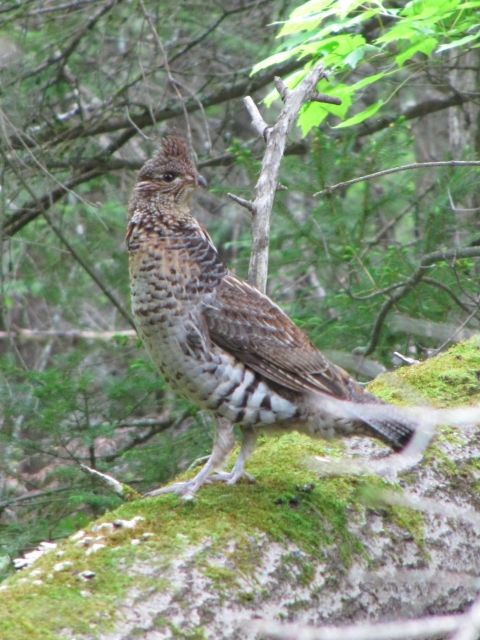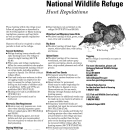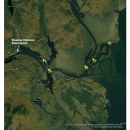
Covering more than 37,000 acres in New Hampshire and Maine, Umbagog National Wildlife Refuge offers first-rate opportunities for all forest game – ruffed grouse, American woodcock, white-tailed deer, black bear and moose. The refuge is open for almost all general hunting seasons in the two states. Pointing or flushing dogs are invaluable for finding ruffed grouse and woodcock in this big country. The refuge has some of the best moose habitat in the country, and success rates are often 90 percent on moose hunts in the area. Because of the size of this large animal, the refuge allows, through a special-use permit, hunters to use all-terrain vehicles (ATVs) to haul moose out of the woods. Deer hunting is popular on the refuge, and participants enjoy the challenges of hunting the large wooded landscapes of the northern forest. Snow, always a possibility, aids in learning and tracking deer movements. Bear baiting is prohibited, but hound hunting is legal and popular among local hunters. The adjacent timber company lands are predominantly open to traditional public uses, further extending the large block of terrain available for hunting. Waterfowl hunting is allowed in the expansive wetlands on the refuge in both states. Waterfowl hunting blinds, located on the New Hampshire side of the refuge, are available by reservation.
Those hunting within the refuge must follow all regulations as described in the New Hampshire or Maine hunting regulations, seasons, and bag limits as well as the refuge-specific regulations outlined below.
Although hunters will not be required to obtain permits to hunt on the refuge, they may be asked to participate in hunter surveys in conjunction with state agencies. This will enable the refuge to gather information regarding the hunt, which will be valuable in assessing and managing future hunting programs.
General Guidelines
- Refuge hunting hours coincide with state hunting hours, but can not be longer than from one half hour before legal sunrise to one half hour after legal sunset. The refuge is closed to night hunting (50 CFR 32.48).
- Use of an artificial light to spot, locate, or take wildlife is prohibited.
- When state and refuge regulations differ, the more restrictive rule applies.
- Commercial/profit making ventures (including guiding) are not currently available. Contact the refuge office for more information.
- Cars and trucks are welcome to drive on logging roads to access the refuge, however, driving on skid roads or skidder trails is prohibited. ATVs and UTVs are prohibited (50 CFR 27.31(f).
- Hunting over bait is prohibited (50 CFR 32.2 (h).
- All species harvested must be retrieved.
Non-toxic Shot Requirement
- Hunters may only possess non-toxic shot when hunting migratory game birds or upland game (50 CFR 20.21(j).
- When hunting big game, non-toxic bullets and shot are recommended (but not required) to reduce the risk of lead poisoning.
Hunting with Dogs
- We allow the use of dogs to assist in hunting, and in retrieval of harvested game.
- Dog training is not permitted on the refuge (50 CFR 27.91 and 26.216).
Waterfowl and Migratory Game Birds
- We allow hunting of duck, goose, snipe, coot, crow, and woodcock.
Big Game
- We allow hunting of black bear, coyote, white-tailed deer, wild turkey, and moose.
Upland Game
- We allow hunting of fox, raccoon, woodchuck, red and eastern gray squirrel, porcupine, skunk, snowshoe hare, ring-necked pheasant, and ruffed grouse.
Blinds and Tree Stands
- Permanent waterfowl blinds are available at various locations on the refuge in NH. Scroll down to find a map of the duck blind locations.
- Reservations for permanent blinds may be made beginning the first Monday in August at noon. Reservations are for one week, Monday through Sunday, during the hunting season.
- UPDATE: Blind #2 has been relocated. Please refer to the updated map.
- Reservations for additional weeks may be made up to one week in advance on a space available basis.
- Temporary waterfowl blinds are permitted, but must be removed daily (50 CFR 27.93-27.94).
- Temporary tree stands and blinds (for hunting species other than waterfowl) are permitted on the refuge and may be erected no earlier than 14 days prior to the hunting season and must be removed within 14 days after the hunting season (50 CFR 27.93-27.94).
- Tree stands and temporary blinds must be clearly marked with the owner's hunting license number.
Trapping
- The refuge is currently not open to trapping.
For further hunting information or to reserve a duck blind, contact:
Umbagog National Wildlife Refuge
P.O. Box 240
Errol, NH 03579
Phone: (603) 482-3415
lakeumbagog@fws.gov
Lake Umbagog National Wildlife Refuge is one of over 550 refuges within the National Wildlife Refuge system. Compatible public use is encouraged on the refuge including, wildlife observation and photography, environmental education and interpretation, fishing and hunting. For a current listing of state-specific refuge regulations, look at the Code of Federal Regulations pages for New Hampshire and Maine.
For a list of all federal laws governing hunting on National Wildlife Refuges, visit the Code of Federal Regulations Wildlife and Fisheries website.
Visit the NH Fish & Game website or the ME Inland Fisheries & Wildlife website for more information on state regulations.


